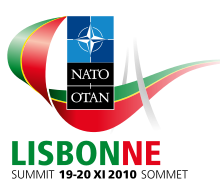2010 Lisbon summit
| 2010 Lisbon Summit NATO Summit Lisbon 2010 |
|
|---|---|

Logo of the 2010 Lisbon Summit
|
|
| Host country | Portugal |
| Date | 19–20 November 2010 |
| Venue(s) | FIL – , Parque das Nações |
| Cities | Lisbon |
| Website | Official website |
The 2010 Lisbon summit was a meeting of the heads of state and heads of government of NATO held in Lisbon, Portugal, on 19 and 20 November 2010.
The member states adopted a new "Strategic Concept", the alliance's new ten-year plan following the expiration of the previous plan adopted at the 1999 Washington summit. In addition to accepting the Strategic Concept that addressed the alliance's modern challenges such as terrorism and cyber attacks, the members agreed to develop a mutual missile defense system. The members met with President of Afghanistan Hamid Karzai regarding the group's operations in the country. They agreed to gradually withdraw combat forces from the country with a completion date of 2014. NATO reaffirmed their commitment to remain in Afghanistan to provide training and advice to Afghan forces and police.
The summit took place in the Feira Internacional de Lisboa in Parque das Nações (Park of the Nations). It was the first summit presided over by Anders Fogh Rasmussen, who began his term as the Secretary General of NATO in August 2009.
Source: [2]
Going into the summit, the member states were expected to adopt a new Strategic Concept for the first time since 1999. Prior to the summit, Secretary General Rasmussen personally prepared a draft of the plan. Rasmussen said the goal of the new Strategic Concept "must reconfirm Nato's core task – territorial defence – but modernise how we do it, including cyber defence and missile defence." A group of experts led by former United States Secretary of State Madeleine Albright drafted a report to help prepare the plan. At meetings prior to the summit, officials said that the plan was "98% there" and that any additional disagreements would be addressed at the summit. The draft acknowledged that modern threats to the alliance's members come in non-traditional forms such as terrorism, possessing weapons of mass destruction, and cyber attacks that could disrupt power infrastructure.
...
Wikipedia
